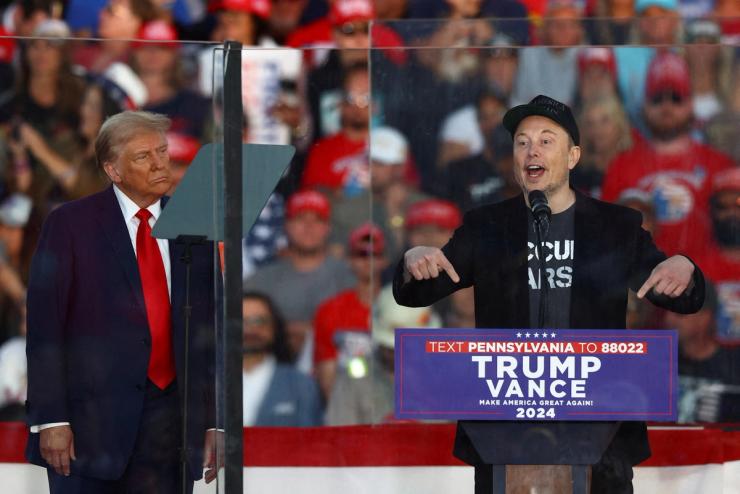The News
A second term for Donald Trump — which promises an enhanced role for Tesla CEO Elon Musk — marks uncertainty for the future of the electric vehicle industry.
In the US, climate change skeptic Trump has repeatedly criticized the EV industry, suggesting the cars are unreliable, threatening to roll back subsidies for EV-buyers, and suggesting he would cut state emissions regulations.
However, Chinese EV-makers appeared cautiously optimistic about the prospect of Trump’s return to the White House, hoping that Musk, who has deep ties to Beijing, can be an advocate for their industry — despite Tesla being a main competitor.
SIGNALS
Trump is a win for Tesla but likely a blow for the larger industry
Tesla’s shares surged more than 12% Wednesday following Trump’s victory as investors appeared to celebrate the incoming president’s alliance with Musk. “Elon made a big bet and was right,” one analyst wrote, adding that the billionaire’s vocal backing of the Republican candidate reassures investors that “his next big bet has a greater potential to succeed.” But his win could be an “overall negative” for the electric vehicle industry if Trump, who has claimed EVs are being forced on consumers, makes good on promises to withdraw tax incentives and rebates for manufacturers, another analyst told Business Insider. However, such actions would likely leave Tesla unscathed given its sheer size and market position, he added.
Chinese EV-makers are cautiously optimistic about a second Trump term
Chinese electric vehicle executives are hoping Musk can convince Trump to embrace the industry, business magazine Caijing reported, despite the former president’s repeated bashing of EVs. While Tesla remains a significant competitor for Chinese EV-makers, Trump’s “pragmatic” approach has seen him express interest in allowing Chinese firms to build factories in the US to increase domestic manufacturing and job creation, Caijing wrote. But Trump won the election largely by tapping into protectionist and nationalist sentiments among blue-collar workers — particularly in the rust belt — Caijing argued, meaning that inviting Chinese EV-makers to invest in the US could prove “too risky.”
Beijing likely to leverage Musk-Trump channel, especially on Taiwan
Musk is “extremely pro-China,” China analyst Derek Scissors told Bloomberg, often flattering Beijing in order to get special treatment over other foreign investors, such as securing access to senior Chinese leaders and winning the green light for Tesla to build its Shanghai gigafactory. Beijing will “absolutely” use its relationship with the billionaire to try to influence the Trump administration,” he said. Of particular concern is the future of Taiwan, which Beijing sees as a renegade province of China: Musk has previously said China should have sovereignty over the self-governing island, and Trump has expressed skepticism over US defense commitments to Taiwan. Neither man gives “a hoot about national security or [defines] it the same way the current administration does,” a Trivium China analyst said.



